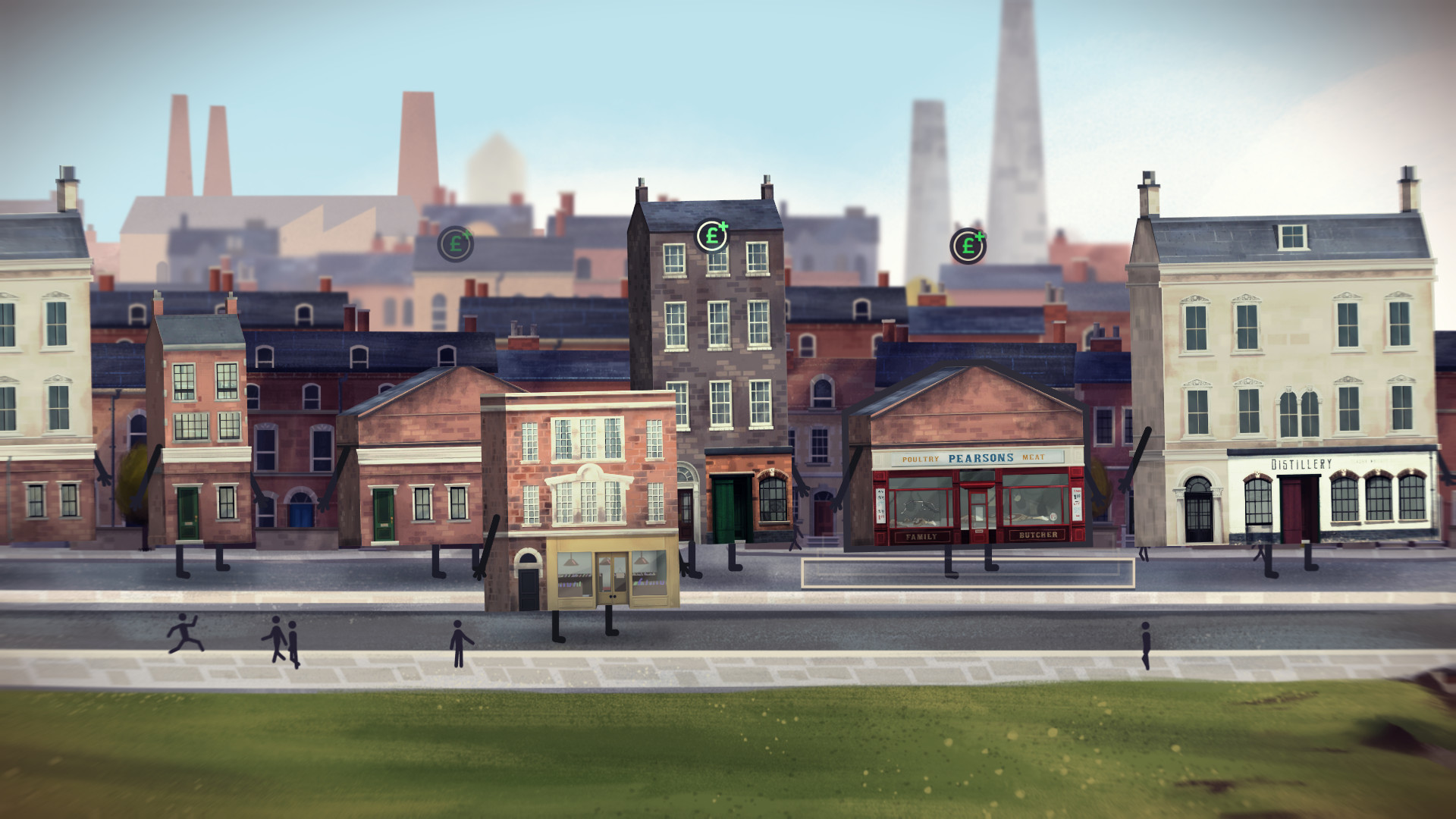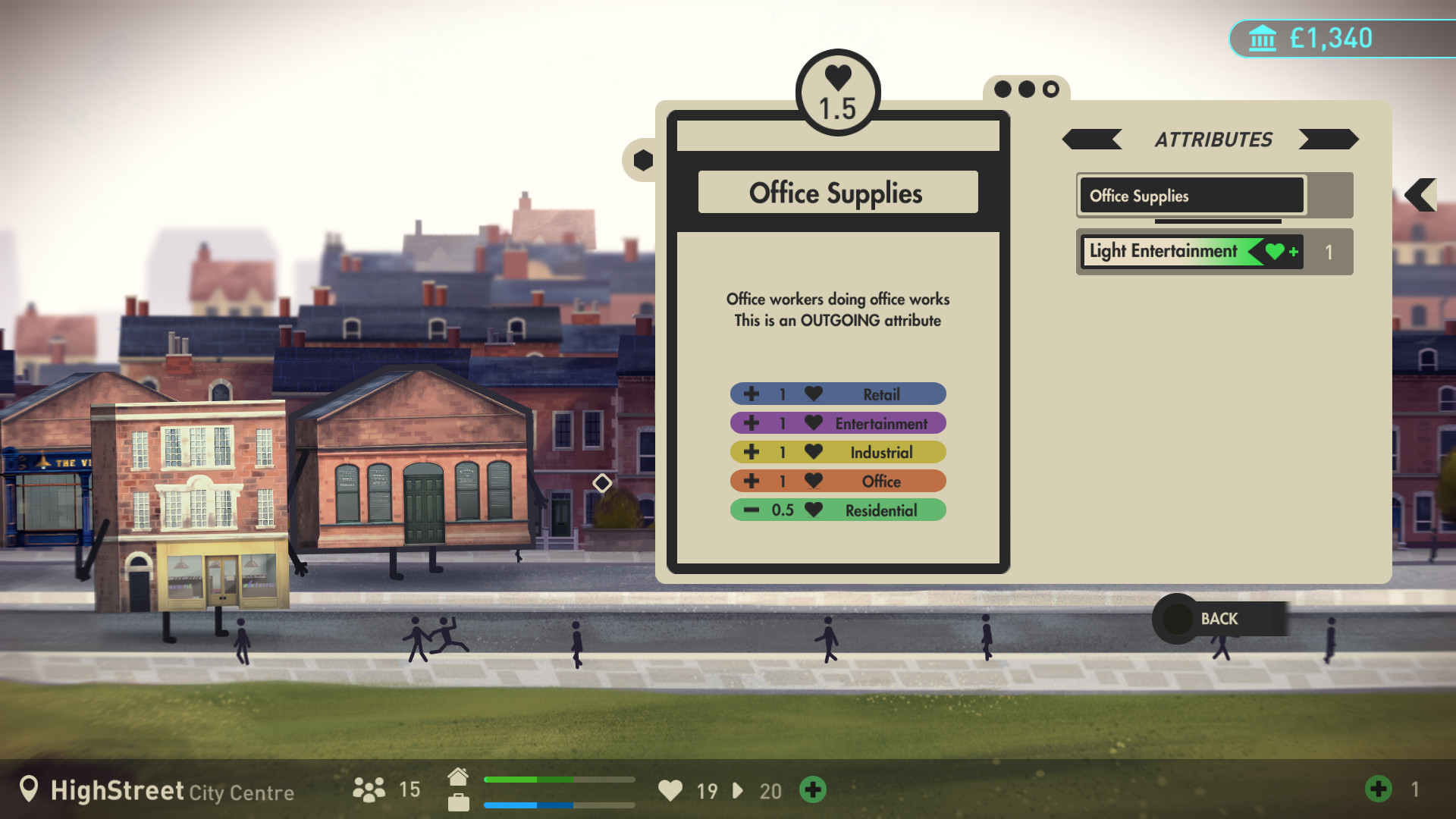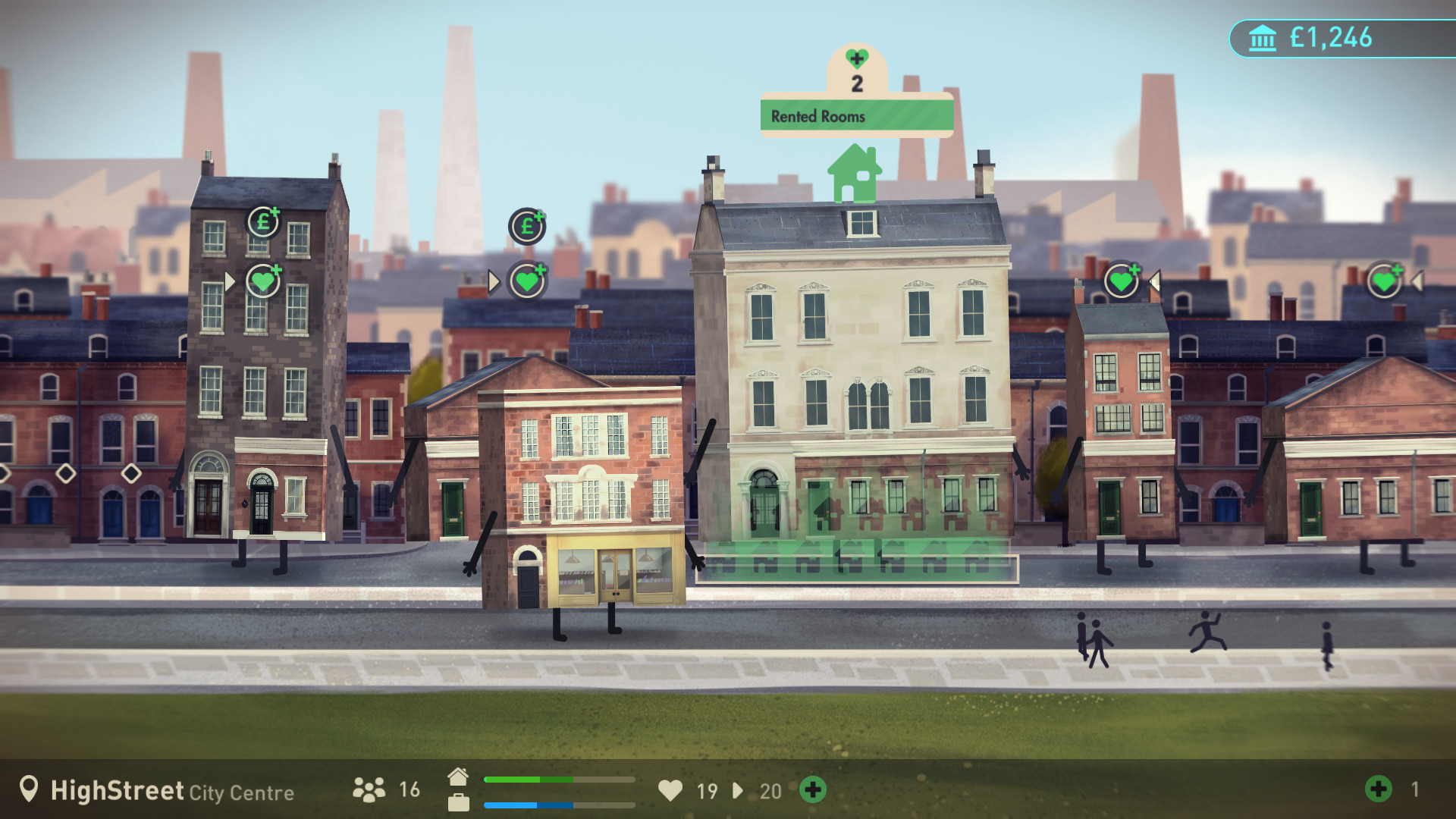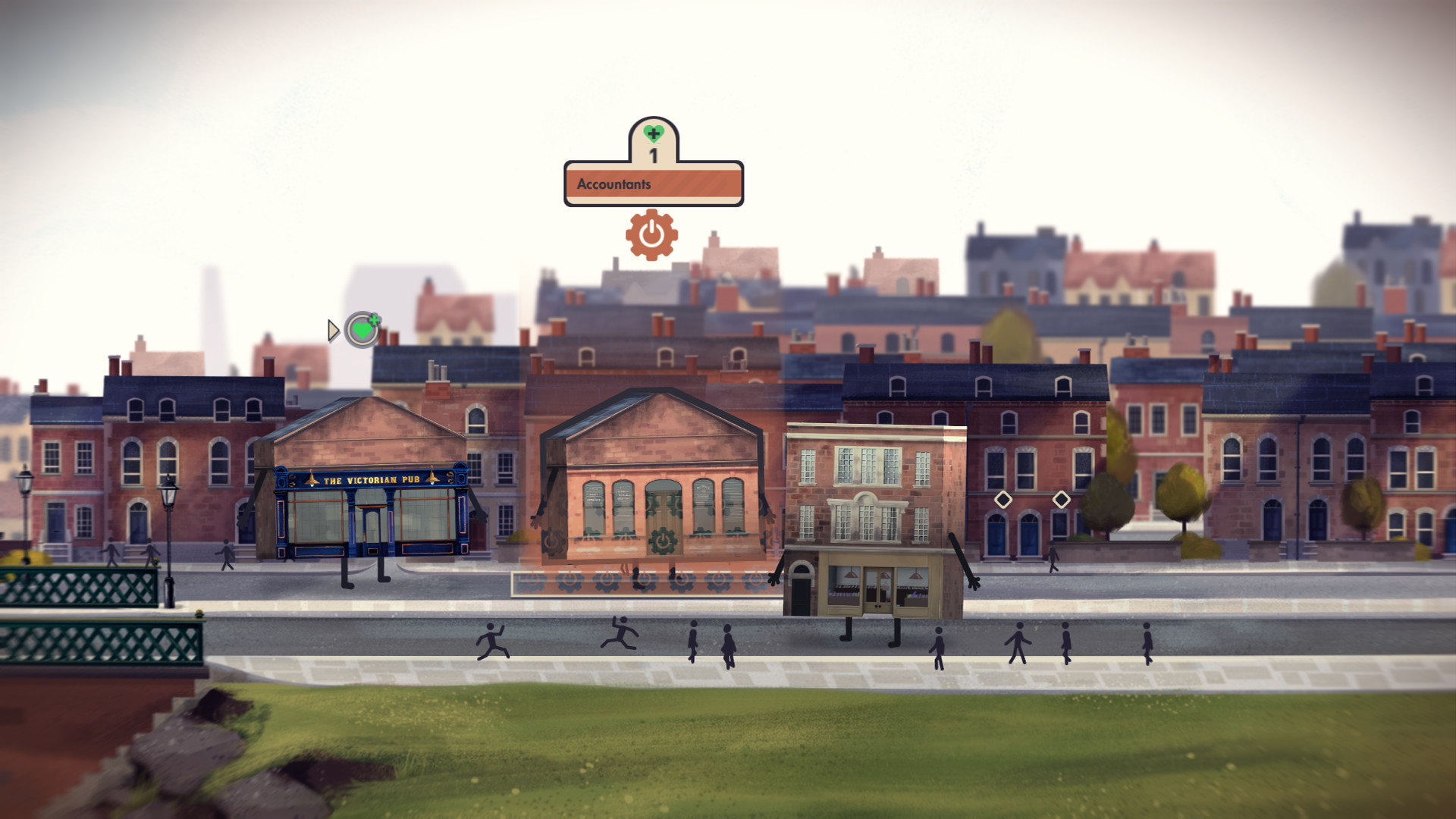
We’ve played tons of city building and management games over the years, to the point where the formula and nitty-gritties of the genre have become very, very familiar to us. But what if instead of worrying about the large scale macromanagement stuff, we had to worry about individual buildings, each of whom have their own ideas about how they should function, morale relating to how busy they’re being kept? Buildings Have Feelings Too takes that unique, curious concept and runs with it. Naturally, we’ve been excited to learn more about this game, and as such, recently we sent across a few of the questions swirling around in our minds to the developers. The following questions were answered by creative director Benjamin Donoghue.
"Whenever people ask how you come up with ideas, I sometimes feel they expect some sort of eureka moment, but in reality, it’s usually the culmination of lots of small things that eventually come together over time. "
City building and management games are a dime a dozen, but this is something quite How did you come up with this idea?
I’ve always been fascinated with how cities work. Fundamentally they all function in the same way, but you’d rarely confuse one for another.
I grew up in the countryside around London and it was the first city I got to travel to and explore on my own as a teenager. The most exciting thing was finding these little urban pockets that felt like they couldn’t exist anywhere else but that exact time and place. A hidden-away venue that used to be a copper mill factory tucked in through a cobbled alleyway, overlooking some old church. They are the kind of places that feel like they couldn’t have been designed by a person but instead designed by the city itself over hundreds of years.
My partner and I moved over to Belfast in Northern Ireland, where the game is set, about 6 years ago for a new job. Belfast has a strong industrial heritage, with the shipyards that built the Titanic and the surrounding industries, such as linen, and rope production. They’re all industries that don’t really exist anymore, however you can still see it in some of the architecture. It felt like there was this odd parallel between our own personal anxiety towards career and life goals and these old buildings that had somehow pulled through and adapted to still be part of the city. The more I began to explore the idea the more the analogy between building problems and people problems made sense.
Whenever people ask how you come up with ideas, I sometimes feel they expect some sort of eureka moment, but in reality, it’s usually the culmination of lots of small things that eventually come together over time. That being said, maybe I just thought the idea of a building running around and picking up people was silly and have been trying to retroactively justify ever since so I can make a game about it.
How deep will the entire concept of having to take care of each individual buildings go?
In general, a busy building is a happy building, so its about making sure each building is given something to do and it is helped to thrive. Each building can be equipped with a business, whether it be apartments, or shops, or factories. As time progresses new industries unlock and old industries will being to fail. It then becomes about re-purposing and swapping out those businesses. However certain buildings will have different ideas about what they want to be doing. How do you deal with a factory building that wants to remain in heavy industry when there is no heavy industry left, or a fancy Bank building that hates being around cheap housing? The unhappier they are, the harder it is to keep them busy which opens up the risk of them being demolished.
As an extension to that question, can players expect more microscopic management?
The game strategy primarily is based on which building is best suited for a business and how you can support it with its surrounding neighbours. As each building runs more successful businesses, the player can unlock permanent bonuses called infrastructure. A building that’s always had bars and restaurants might gain a commercial kitchen, for example, making it better and running this type of business in the future.
As the buildings are alive you also have the advantage of being able to move and rearrange them to maximize its success. The primary loop is about working out what resource you need next and how you can rearrange your city to gain it whilst making sure you don’t let a building become neglected. We have a huge range of businesses so there will always be more than one way to solve a problem. We’re hoping this will allow player’s cities to be very different from each other.
"Our underlying system works quite similarly to traditional city management games. It’s about balancing your workforce and residents, increasing your city’s budgets to expand and build more buildings and utilizing different industries to attract different specialists. Where it differs is that some buildings might have a different idea of what they want compared to the overall city’s needs."
How does the game strike that balance between that and more conventional city management?
Our underlying system works quite similarly to traditional city management games. It’s about balancing your workforce and residents, increasing your city’s budgets to expand and build more buildings and utilizing different industries to attract different specialists. Where it differs is that some buildings might have a different idea of what they want compared to the overall city’s needs. It’s then up to the player to decide, do I use resources to keep this building happy so I can keep its unique value to this neighbourhood, or is it better to demolish it and spend those resources on new buildings that are less demanding?
Can you shed some light on a few interesting mechanics that exist because of your game’s unique concept?
We’ve had a lot of inspiration from real life, speaking with heritage societies and city planners, and tried to reflect that in some of the game mechanics. For example (in real life) if a building becomes disused they usually have a 6-month window where if they go beyond that the costs of renovating and repurposing outweigh the cost of just demolishing it and building something new. In the game, as buildings run more failed businesses, become unhappy or age over time, it is harder to keep the building occupied and in turn, they are more likely to become disused, resulting in its demolition. Newer buildings might be easier to keep busy however won’t have the heritage and perks the older buildings have.
Have you looked at any city building titles, in particular, to draw inspiration from for Buildings Have Feelings Too?
I’ve personally put a lot of hours into games like Cities: Skylines and the Civilization series, so things like industries and tech trees should feel familiar. I also enjoyed how the Tropico series bring in a sense of personality and back story to the city management genre. We wanted to get that balance of a growing city at the same time as being able to experiment with different layouts and give time for the player to sit back and enjoy watching the city they’ve made. Though a very different genre, one of my favourite recent games has been the new Hitman series. I spend most of my time in the game just exploring and trying to catch all these conversations of the bystanders going about their everyday life. We’re hoping to capture that same sense giving a glimpse into the everyday life of buildings.
There also a great game called Concrete Jungle, which is more puzzle/deck based but gets a great balance between personality and gameplay. It also has some great adjacency mechanics and, alongside an equally great board game Suburbia, has helped us expand and explore our own designs. Reus, Block’Hood, and Simmiland are also fantastic games I’d recommend when it comes to exploring and experimenting with combinations in the management genre.
Will buildings’ “feelings” differ based on what kind of building they are and what purpose they’re supposed to serve?
A building’s personality is primarily based on what they were built for originally. We have a number of unique hero buildings that can only be built once and some of their interactions explore this in more depth. Old Factories will love industry, Banks will love commerce, Markets will love shops. However, some of our more narrative elements will see personalities change over time depending on how the player helps them Some might learn to adapt whilst others remain stubborn. We’re hoping there should be some universal stories there.
"We have a load of ideas we’d love to keep adding to the game for players, but that will depend on how players react to the game and where they’d like to see it go. I’m excited to how players respond, but either way we’re certainly not short on further ideas to expand the game."
Is there any update on a more specific release date for Buildings Have Feelings Too?
We’re working hard to get the game as great as possible for this Summer, but don’t have a fixed release just yet.
Do you have any post-launch plans for the game at the moment?
We have a load of ideas we’d love to keep adding to the game for players, but that will depend on how players react to the game and where they’d like to see it go. I’m excited to how players respond, but either way we’re certainly not short on further ideas to expand the game.
The Nintendo Switch seems to have become the go-to platform for both, indie developers and those who love to play indie games. As an indie developer yourself, what are your thoughts on the system? Do you think it presents any unique advantages to a particular style of games?
The portability of the system is definitely great. I think the key has been maintaining the console quality of games with the pickup and play mentality. We’ve tried to make sure our game gives the players time to sit back and enjoy their achievements in the game without a constant rush so having a handheld version feels great whilst allowing the player to play at home on a larger screen.
Will the game feature PS4 Pro and Xbox One X specific enhancements? What can players expect if they are playing the game on Xbox One X and PS4 Pro? Is 4K/60fps on the cards?
We want to give players a consistent experience across the different platforms both gameplay wise and visually. We’re still optimizing so it’s not off the cards however it will be playing and looking great on original hardware too.
Next gen is coming sooner or later. From a development perspective, what is your biggest expectation from PS5 and Xbox Scarlett?
We were over at GDC this year where Google announced their new offering Stadia. I think both PlayStation and Xbox will up their streaming offerings in some capacity. I’m not completely sold on a streaming-only platform as I think having both software and hardware at home offers a much better consumer experience. However, things like being able to play a game straight away via streaming whilst full downloads are either happening in the background or scheduled for later would be a good thing. Even physical copies of a game often require a day one patch so to improve this experience could only be beneficial.
Increase in processing and graphical power is always expected, however, really this is more for the larger AAA studios to push the technical boundaries on. Consumer expectation always gets higher and high-end assets take a huge amount of time to create which is hard for indie developers to compete on. Where indies excel is in creating new and exciting ideas alongside being able to target more niche markets. But to make that viable, consoles need to be as accessible as possible for everyone and curated in a way that allows players to find the games they love, rather than being thrown to the same top 10 all year round.
"I play across both PC and console so I think cross-platform play is a good thing, however, I don’t play many games where this would completely transform my experience."
Do you think cross-platform play will be one of the defining features of next-gen consoles?
I play across both PC and console so I think cross-platform play is a good thing, however, I don’t play many games where this would completely transform my experience.
We’ve got to a point now where gaming really is for everyone, and what’s exciting about having such a large and diverse audience is that not everyone needs to like the same things. Games are almost at the tipping point of where TV, film, and music are, where so many different subsections are catered for with great content. I’m hoping next-gen will help better curate this and encourage a diverse set of communities without sacrificing the quality of their central market. Cross-platform play is certainly part of this though.
What is your take on the ongoing drama of loot boxes and microtransactions?
As a player, I very quickly get put off games that push loot boxes as the only way to progress. It can be a very data-driven approach to game design where unfortunately maximizing revenue and player retention often take a front seat. It is an issue when I have to ask is this experience enjoyable for me or am I just here to make the experience enjoyable for another player who is spending more money than I can.
Microtransactions can be a great way to show appreciation to developers though. I’ve played through a few games now where I thought it was great value for money and happily paid for an extra costume or DLC pack. But it should never interfere with letting the player have a great experience because that’s why we make and play games.


















